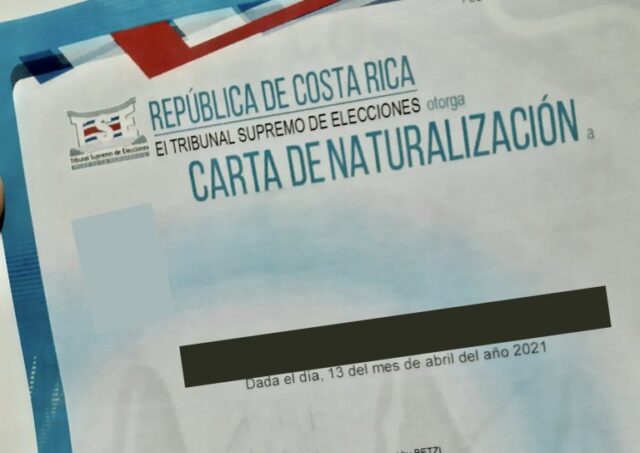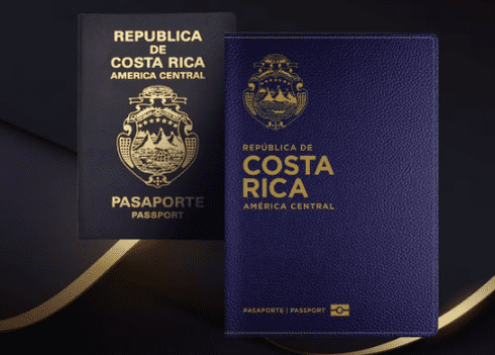Did you know that, in the most recent 10 years, 50 thousand foreigners have become naturalized Costa Ricans? These people come from 116 countries and territories of the world, the information was provided by the Supreme Electoral Tribunal (TSE).
According to TSE data, the number of naturalized foreigners has varied over the years: From 2013 to 2015 the numbers were no more than 4,000 per year; In 2016, 2017, 2018 and 2019 the figure was 5,500 people; In the years 2020 and 2021 the number of naturalized foreigners decreased, possibly due to the pandemic; In 2022 and 2023 the numbers rose again, exceeding 5,000 people. Everything adds up to a total of 50,433 foreigners.
It is said that 10 nationalities made up 90% of naturalizations in the last 10 years.

Very importantly, approximately 30,000 Nicaraguans are already considered Costa Rican citizens, likewise, more than 5,000 Colombians, 2,600 Venezuelans, and 1,000 Salvadoran, Panamanian, and American citizens. Also, there is a situation in which only one foreigner has been naturalized, specifically from 23 countries, to mention a few of them: Indonesia, Luxembourg, Somalia, and Kazakhstan, among others.
Another 123 naturalized people have been Ngöbe Buglé indigenous people who have historically lived between the territories that today correspond to Costa Rica and Panama.
Requirements to request naturalization and what are the benefits?
Mainly, people should know that naturalization is different from residency.
The Supreme Election Court is the body that, together with the Civil Registry, is in charge of the naturalization process.
After the person obtains their Costa Rican nationality, they receive an ID card or identification document equal to the Ticos at birth.
Four procedures group the majority of applications: marriage with a Costa Rican person for at least two years, permanent residence for at least five years, permanent residence for at least 20 years, and transcendence, which means obtaining Costa Rican nationality for minors when one of their parents has naturalized.
The requirements for the naturalization procedure are A copy of your proof of identity, criminal record, and some proof that you receive financial support, among others.
Any foreign person can apply for naturalization, as long as they do not have a criminal record or are involved in illegal activities.
The naturalization process has a waiting period of 10 months.
All those naturalized people (Ticos) will have greater access to the public services of Costa Rica and the attention of institutions from which they were deprived for decades due to not having citizenship.
Attention Ticos! Did you know that the Costa Rican passport is number 25 of the most powerful in the world? In this year 2024, the Costa Rican passport allows its citizens to enter 91 countries without a visa and 47 with simple requirements.
Through the Global Passport Power Ranking 2024, carried out by the global financial advisory firm Arton Capital, which analyzed passports from 198 countries in the world, it was known that the Costa Rican passport is number 25 of the most powerful in the world; In the number 1 position is the United Arab Emirates.
The firm also classified how many destinations it has access to that document without a visa, with a visa, with an electronic visa, and a formal visa.
It is wonder! With the Costa Rica passport, you can travel to more than 90 countries without carrying out major procedures.
Argentina, Belgium, Brazil, Croatia, Iceland, and Japan are some of the countries where you can enter with a Costa Rican passport without the need to obtain any type of visa or authorization.


It should be noted that the firm that carries out the ranking starts from four destination categories: visa-free (they do not ask for a visa); application for a visa, visa on arrival, electronic visa, or some type of tourist letter that does not involve an application process; Electronic Travel Authorization (ETA), which is similar to a visa but of a lower rank; and the application process for a formal visa with restrictions.
Regarding visas, they can be processed in a matter of hours when they are electronic but can take weeks when they are formal visas. The procedure is not necessary for those Costa Rican people who wish to travel to some of the 91 countries that do not require a visa for Costa Rican tourists.
Finally, in 54 countries such as the United States, Canada, Afghanistan, Algeria, and Morocco, a visa is requested from Costa Ricans. The majority of destinations that do not require a visa from Costa Ricans are in Europe and America.


Source link
TCRN STAFF



